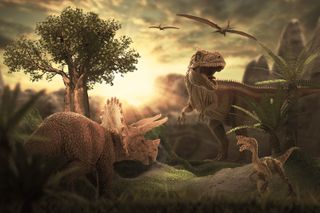Will Dinosaurs Walk the Earth Again
Could Evolution Ever Bring Back the Dinosaurs?

Did you lot watch the 1993 movie blockbuster "Jurassic Park" and wonder, "Could this happen for real? Could the dinosaurs always come back?" The idea that these mighty creatures could wander our Earth once more some day is for almost humans both fascinating and terrifying in equal measure out.
Even existent-life scientists are intrigued every bit to whether the evolutionary procedure could bring us back to the time of the Tyrannosaurs. Merely Susie Maidment, a vertebrate paleontologist at London's Natural History Museum, quickly dismissed the notion that a DNA-filled mosquito preserved in amber for millions of years — as in "Jurassic Park" — could ever help recreate an extinct dinosaur.
"We practise accept mosquitos and biting flies from the time of the dinosaurs, and they do preserve in amber," Maidment said in a argument. "But when bister preserves things, it tends to preserve the husk, not the soft tissues. And so, you lot don't become blood preserved inside mosquitos in bister." [Is It Possible to Clone a Dinosaur?]
Researchers accept establish blood vessels and collagen in dinosaur fossils, but these components don't accept bodily dinosaur Deoxyribonucleic acid in them. Unlike collagen or other robust proteins, Deoxyribonucleic acid is very frail, and sensitive to the furnishings of sunlight and h2o. The oldest DNA in the fossil tape is around ane million years old, and the dinosaurs died out near 66 million years agone.
Maidment added: "Although nosotros have what appears to be blood from mosquitos upwards to 50 one thousand thousand years old, nosotros oasis't establish Dna, and in order to reconstruct something, nosotros need DNA."
Jamal Nasir, a geneticist at the Academy of Northampton in the United Kingdom, said he wouldn't rule out the thought of dinosaurs evolving dorsum from the dead. In his opinion, development isn't fixed or planned. In other words, anything could happen. "Evolution is largely stochastic [randomly determined], and evolution doesn't necessarily have to go in a forward direction; it could have multiple directions. I would contend that going back to dinosaurs is more than likely to happen in reverse, because the building blocks are already there."
Of class, Nasir pointed out, the correct atmospheric condition would take to be for dinosaurs to reappear. "Conspicuously, 1 could imagine viral pandemics that might disrupt our genomes, our physiology and behavior across our control," he told Live Science. This, in turn, could create the right conditions for evolution to have a path toward reinventing the ancient reptiles.
However, while development might not be directional in any item sense, something nosotros do know is that nosotros don't see the same beast evolving again, Maidment countered. "We can encounter an animal that is closely related occupying a similar ecological niche — for example, ichthyosaurs were marine reptiles with long pointy snouts and dolphin-similar body shapes and tails," she told Live Science. "Today we run into the dolphin, and they probably occupy a similar ecological niche. Just we wouldn't draw a dolphin as an ichthyosaur because they don't possess the anatomical characteristics that let them to be ichthyosaurs." [What If a Giant Asteroid Had Not Wiped Out the Dinosaurs?]
Besides, dinosaurs never quite died out in the first place, Maidment said. Birds evolved from meat-eating dinosaurs, and thus in strict biological definition, everything that evolved from this common ancestor is a dinosaur, sharing the same anatomical characteristics, she said.
"Dinosaurs are nevertheless with us," Maidment said. "They say dinosaurs went extinct, but only the non-avian dinosaurs went extinct. Birds are dinosaurs, and birds are still evolving, so we will certainly see new species of birds evolving — and those will be new species of dinosaur."
Some scientists are even dabbling with the evolution process by trying to reverse engineer a chicken into a dinosaur, dubbed the "chickenosaurus." However, this beast, if it ever comes to fruition, would not be a replica of a dinosaur, just rather a modified chicken, Jack Horner, a research associate at the Burke Museum at the University of Washington, previously told Alive Science.
Things have changed drastically over 66 million years, and if 1 24-hour interval a dinosaur evolved dorsum onto Earth, information technology would be to a very different world.
"An animal that died out naturally, possibly 150 one thousand thousand years ago, is not going to recognize anything in this globe if you bring it dorsum," Maidment noted "What is it going to consume when grass hadn't [yet] evolved back then? What is its function, where practice we put it, does anyone own it?"
That said, it may be all-time to allow sleeping dinosaurs prevarication, she said.
- How Practice Dinosaurs Get Their Names?
- Could Dinosaurs Swim?
- How Did Dinosaurs Communicate?
Originally published on Live Science .
Source: https://www.livescience.com/64586-could-evolution-bring-back-dinosaurs.html
0 Response to "Will Dinosaurs Walk the Earth Again"
Post a Comment